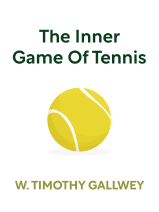

This article is an excerpt from the Shortform book guide to "The Inner Game of Tennis" by W. Timothy Gallwey. Shortform has the world's best summaries and analyses of books you should be reading.
Like this article? Sign up for a free trial here .
What is tennis psychology? How does it help you on and off the court?
Tennis psychology refers to the idea that your mental game of tennis can help you in life as well. You can learn to be less judgmental about yourself, and learn how to stay focused without being stressed.
Read more about tennis psychology and how it works.
Tennis Psychology
Playing the Inner Game on the court can, as proven already, lead to development outside the court. Two clear benefits of tennis psychology are better focus and a better understanding of yourself. But you can practice “The Inner Game” off the court as well. Almost every human activity, from asking for a raise to finding a significant other, will involve an inner and an outer game. One of the biggest benefits of knowing how to play the Inner Game is knowing how to quiet Self 1 to find, define, and finally overcome obstacles to reach goals.
Inner Instability, Inner Stability
In tennis psychology, self 1 can produce significant instability if we listen to it too much. This is because Self 1 can often distort the meaning of an event. Think about a time that you went on a first date and didn’t end up having a second one. There are all sorts of reasons another date may not have worked out. But Self 1 is very capable at producing fears and delusions—maybe you start thinking about what you did wrong and then end by telling yourself that you’re no good at dating and you’ll never find someone you like who likes you back.
Today more than ever, there are constant external pressures like this one that make us feel stressed out. There are demands from your job, your friends, and your family. Most people respond to this by attempting to “manage stress” or take occasional breaks to “unplug.” This usually isn’t that successful—what works better is building up inner stability.
We can do so by understanding that Self 2 has lots of demands itself that actually make us more stable, rather than the demands of Self 1 which make us less so. Self 2’s demands are anything from eating and drinking enough that we’re sufficiently energetic to wanting to learn new skills. Responding to these Self 2 requests helps us build this stability.
Leaving Attachments Behind
Most stress in modern life is caused by attachment—Self 1 becomes so dependent on a job, a relationship, or an idea that when change does come it’s threatening. Freedom from this stress is the recognition that we will be alright if we lose one of these things, so long as we continue to be able to live fairly comfortably.
Here, like in tennis psychology, it’s important to distinguish between what Self 2 needs to operate well and what Self 1 has internalized as a need. A lot of demands that you place on yourself are derived not necessarily from what you need but from what you’ve been told somewhere along the way that you need.
There’s a distinct difference between this and “self-improvement”—everyone’s Self 2 is fine as it is, we just need to listen to it.
After all of this, readers may still be questioning what it means to win the Inner Game. The response is essentially impossible to give, although the question is important. It’s impossible to give because the moment that we give an answer, Self 1 will see a goal that can be conquered. This will add to our stress. The only way to “win” is for your Self 2 to be the only Self that knows when you’re conquering the Inner Game using tennis psychology.

———End of Preview———
Like what you just read? Read the rest of the world's best book summary and analysis of W. Timothy Gallwey's "The Inner Game of Tennis" at Shortform .
Here's what you'll find in our full The Inner Game of Tennis summary :
- Why tennis is actually a mind game
- How to quiet the mind and concentrate intently
- Why your self-worth shouldn't be dependent on how you do in competition






